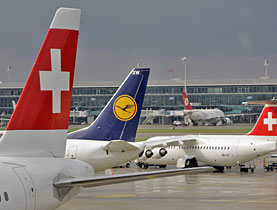Germans experience tide of xenophobia

It has not been easy for Germans in Switzerland of late – right wingers think there are too many of them, and furthermore, Berlin may well buy stolen Swiss bank data.
Social scientist Marc Helbling says migrants have always faced opposition, but the fact that Germans are often highly qualified means competition over jobs. Their direct manner is also not appreciated.
There are now 250,000 Germans in Switzerland, double the number eight years ago. In Zurich alone, where there are 30,000 Germans, there has been a renewed round of “German-bashing” by the rightwing Swiss People’s Party – just ahead of local elections. Their particular bugbear; the high number of German professors in the city’s universities.
Berlin’s willingness to consider buying stolen Swiss bank data to get information about possible German tax evaders is also adding to the resentment mix.
Helbling, a Swiss who works at the Social Science Research Center in Berlin, has recently completed a study entitled “Why the Swiss Germans dislike Germans”.
swissinfo.ch: You talk about “Germanophobia” in your study. Why do the Swiss feel so threatened by German immigrants?
Marc Helbling: In migration research, we often observe that migrants are seen as a threat when they immigrate in large numbers within a short period of time.
From the mid-1990s there has been a strong influx of Germans. This is because Switzerland needs a highly qualified workforce; the 2002 bilateral accords [between Switzerland and the European Union] have also made immigration easier.
Since 2005, the Germans have ranked fourth, in terms of numbers, behind Italians, Serbians/Montenegrins and Portuguese.
swissinfo.ch: The Swiss are afraid of a creeping “Germanisation”.
M.H.: Up to a certain degree, yes. You can see it in the fact that there have been complaints about the Germans in Zurich in particular. As a migration researcher you could almost speak of a Zurich phenomenon. If you ask a French-speaking Swiss or even somebody from [the Swiss capital] Bern, they would certainly not speak in such extreme terms about the Germans.
swissinfo.ch: Is the big influx the only reason why emotions are so high when it comes to the Germans?
M.H.: No, there’s more to it than that. The economic dimension plays an important role. Unlike traditional immigrants of the past, who were not so highly educated, often couldn’t really speak German and took up low-wage jobs, Germans apply for highly qualified jobs.
The typical German migrant has an academic qualification and is a doctor, university researcher or IT specialist. Swiss and Germans are therefore up against each other in a very narrow, highly-competitive segment of the work market.
This explains why you find hostility towards the Germans even among well-educated Swiss. This is a phenomenon which migration researchers do not usually observe. The theory is, the more educated the person, the less xenophobic they are.
swissinfo.ch: According to your study, German are the fourth least popular migrants after those from the former Yugoslavia, and Arab and Turkish migrants. Why don’t the Swiss like the Germans?
M.H.: I was surprised that Germans were the most unpopular west Europeans. We usually assume that people are mostly hostile to migrants from different cultural groups – which, at first glance, does not apply to the Germans.
But unlike Italians or the French, Germans are seen as culturally different by the Swiss. And this is because small differences between the cultures are perceived to have great importance.
The best example is language. Swiss German dialect [spoken on a daily basis in Switzerland] and High German [spoken in Germany and in formal contexts in Switzerland] are close relatives, but Swiss German is considered part of identity development. Those speaking High German are automatically foreigners.
swissinfo.ch: Many Swiss have an inferiority complex about speaking High German.
M.H.: Yes, most Swiss can’t express themselves so eloquently in High German and generally tend to speak more slowly than Germans, so this has strengthened their aversion to it.
But there are also other small things. In certain situations Germans often behave in a more assertive and direct way than the Swiss, which time and again meets with strong resistance.
Germans are thus quickly considered to be aggressive. The Dutch, on the other hand, although often described as loud, are not regarded in the same light.
swissinfo.ch: In the 1950s-1960s there were big xenophobic campaigns against Italian migrants. Nowadays Italians are appreciated. Could this also happen to the Germans?
M.H.: This is likely to happen, – there are numerous examples in migration research. However, simply riding out the xenophobic wave as experienced by the Germans in Switzerland is not a solution. Racism should always be taken seriously and be fought against.
For Switzerland, this means that the political world should not leave the field open to the People’s Party, which is a past master when it comes to stoking xenophobic tendencies. As was the case with the Minaret Initiative [successfully led by the party to ban minarets in Switzerland], I’m missing strong voices from the other political parties in this current debate.
Paola Carega in Berlin, swissinfo.ch (Translated from German and adapted by Isobel Leybold-Johnson)
The study, entitled, “Why Swiss-Germans dislike Germans. On negative attitudes towards a culturally and socially similar group” , found that Germans were not generally well liked in Switzerland. Although the phenomenon is well known, it is the first time that it has been researched more closely from a social science perspective.
Helbling highlights the background to “Germanophobia” based on a survey from the 1990s.
This asked 1,300 Swiss in Zurich aged 18-65 about different migrant groups, but the part about the Germans has not yet been subject to special research.
The social scientist, who studied in Lausanne and Paris, finds the relationship between the Swiss and the Germans so interesting because it show how highly educated and culturally matched migrants can meet with resistance.
“Integration is really much more complex,” he writes.
Higher education and cultural integration does not solve the problem of resentment of migrants.
A tax dispute between the two countries has been brewing for several years
2006-2008: An employee of the Liechtenstein Global Trust (LGT) sells the German authorities stolen data on more than 1,400 German clients suspected of evading taxes. The authorities use the information to investigate more than 700 German citizens.
German tax officials turn their attention to Switzerland and German and French finance ministers call for Switzerland to be blacklisted as an uncooperative tax haven.
March 2009: Under pressure from the G-20, Switzerland agrees to accept OECD standards regarding exchange of information in cases of tax evasion as well as fraud. The then German finance minister, Peer Steinbrück, angers Swiss by comparing them to Indians “running scared” of the US cavalry.
April 2009: The OECD puts Switzerland on its grey list of tax havens, but Switzerland is later removed from the “grey list” after signing new tax agreements with 12 countries.
Also in 2009: A former employee of HSBC private bank in Geneva takes sensitive client data and hands it over to the French authorities.
January 2010: An informant offers to sell the authorities in the German state of North Rhine-Westphalia the data of about 1,500 possible tax evaders with bank accounts in Switzerland.
Subsequently similar data has been offered to more German states, triggering heated debate in both countries. Germany has said it is considering the offers.

In compliance with the JTI standards
More: SWI swissinfo.ch certified by the Journalism Trust Initiative




You can find an overview of ongoing debates with our journalists here. Please join us!
If you want to start a conversation about a topic raised in this article or want to report factual errors, email us at english@swissinfo.ch.